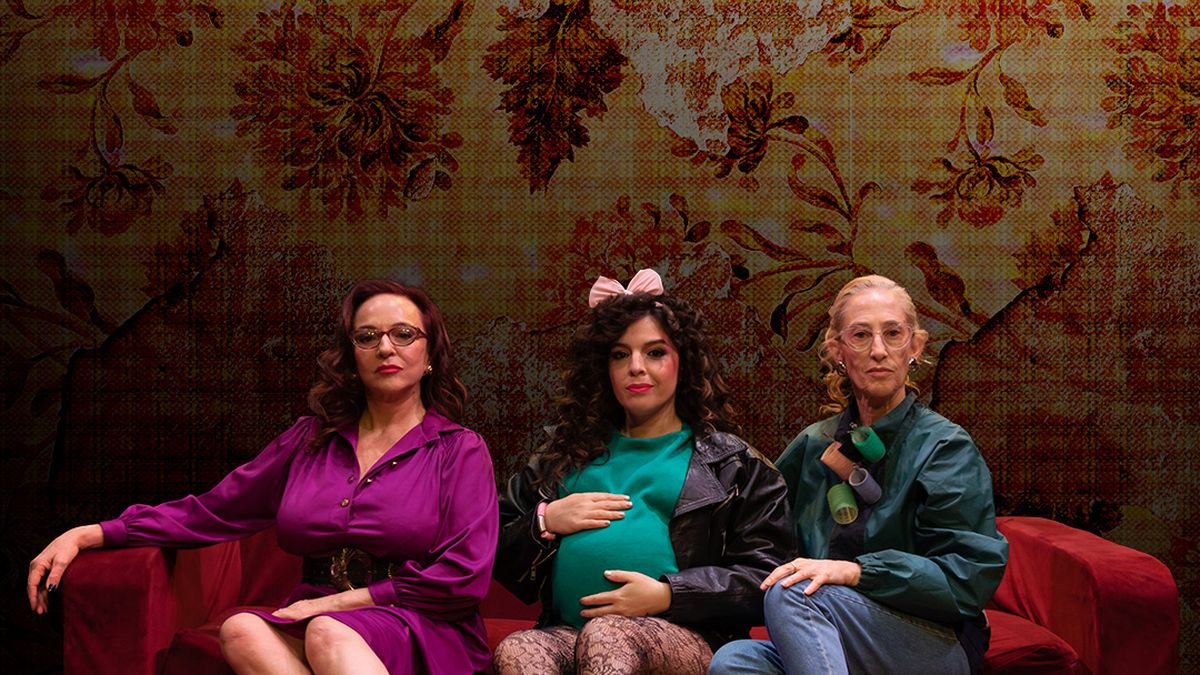“I took my grandmother to the cemetery to visit my grandfather, and then I also accompanied my grandmother’s friends, we had beer, I heard gossip and bought clothes with them. There is some of those experiences, ways of speaking and trying to be recorded,” says Julieta Cayetina about “In the end the tragedies do not improve anyone”a dramatic comedy written and directed by it.
Starring Graciela Stefani, Miriam Odorico and Dalma Maradonathe work invites you to reflect on duels, desires and second opportunities. With general timbre 4 production, it opens on Saturday and you can see every Saturday at 20:30. We talked with the author and director.
Journalist: That title, “tragedies do not improve anyone”, does it have to do with that what does not kill you makes you stronger? What can you reflect on it?
Julieta Cayetina: One believes that by crossing or living a tragedy life will change, but the tragedies cause a cimbronazo to be in a moment and then we are still all the same. It arose in a conversation talking about something and I had that phrase, I included it in the work and then it was a title.
Q.: Do you say that after a tragedy there is no transformation and everything remains the same?
JC: Duels and second opportunities are two themes that interest me a lot, they are part of life, I connect with those situations or people who go through that. There are different types of duels, which is not only losing someone but can be a separation of a couple, friends, leave work by decision or not, change housing, etc. That modifies and generates second opportunities that exist, until the last minute of life.
Q.: After “Elle” and the history of your grandmother and the shoá, does anything appear in this one that has something self -referential?
JC: The two protagonists are called Luisa and Berta, Luisa is my other grandmother who I have with me with 96 years, and Berta was her best friend for the last 20 years of her life. It has nothing to do with them but I lived a lot with them and their friends. Take them to the cemetery to see husbands, mothers, brothers. We had beer, I heard gossip, I bought with them clothes, there is something to register those experiences and ways of speaking, a way of trying to be recorded. I took note and that was the germ.
Q.: How are these widows that survive with gossip, burials and basket games?
JC: They are concumed that lose their husbands one 15 years ago and the other a few months ago. One tries to show the other things in life beyond the loss. The work takes place at the end of the 80s in a town in Buenos Aires, where it was lived in a different way than today. That widow woman feels that her life is over, and both her friend and the niece come to show her no, that you can be sexually active, go out, have experiences with friends, have aganas to live. There is an interesting sexual rediscover. There is life beyond the day between hairdresser or storekeeper, basket games, confinement and duel.
Q.: How were these characters built with the essays?
JC: It took 3 years to write it, rewritten several times and resigned as author. And when I directly written several scenes according to what the setting asked and the actresses offered.
Q.: There are duel and death but also the counterpoint with the pregnant woman and a life to arrive. How do you play with those contrasts, with that circle of life?
JC: Dalma’s character is the protagonist’s niece. There are reflections on that cycle of life not only in terms of death or life but to sexual issues to which they refer. He comes to show that there may be renewal and joy, that babies bring joy and go on this path.
Q.: What prejudices appear in the work and what other topics are there?
JC: Sexuality is one of the great issues that are addressed with humor and depth. We talk to the actresses, putting sexuality on the table at certain times of life that were previously taboo. Today women of 70 or 80 can be shown and do different things from before. The work opens the possibility of recognizing the same as a woman and sexual subject, or whatever for the same. Prejudices are that not everyone wants or dare to talk about it.
Source: Ambito
I am an author and journalist who has worked in the entertainment industry for over a decade. I currently work as a news editor at a major news website, and my focus is on covering the latest trends in entertainment. I also write occasional pieces for other outlets, and have authored two books about the entertainment industry.




